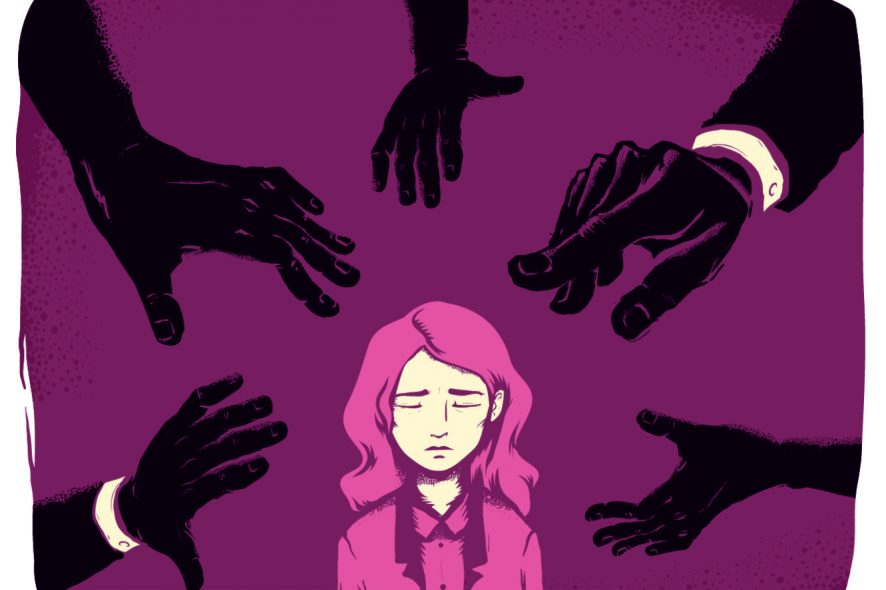The Indian legal profession, often celebrated as a guardian of justice, equality, and fairness, harbors a less acknowledged reality. It remains deeply entrenched in patriarchal structures, where systemic sexual harassment often renders the field inhospitable for women. This issue, while widely recognized by those who practice law, remains largely unspoken, perpetuating a culture of silence and impunity.
The judiciary, intended to epitomize fairness, paradoxically becomes a stage for predatory behavior. Indira Jaising, an eminent lawyer and the first woman to serve as Deputy Attorney General of India, has referred to sexual harassment in the legal profession as its “hidden dirty secret.” Her observations highlight the disturbing reality that even within the esteemed Supreme Court, women are not insulated from harassment. First-hand accounts of female lawyers and judges encountering inappropriate behavior underscore the pressing need for systemic reform.
While courts and judicial chambers symbolize justice, the working environment often falls short of this ideal. These spaces must serve as sanctuaries of professionalism and fairness, free from harassment. Unfortunately, the presence of systemic sexual predation undermines this ideal and alienates women from contributing fully to the legal ecosystem.
Institutional and Structural Gaps
The root causes of this pervasive issue lie in the structural weaknesses of the legal profession. The reporting mechanisms for sexual harassment are insufficiently robust to instill confidence among victims. This inadequacy reflects a broader culture of secrecy and suppression that permeates the legal field.
The profession’s lack of supportive structures for women, particularly mothers, compounds these issues. It perpetuates an environment that normalizes repression and discourages transparency. Young women, including associates and interns, are particularly vulnerable to exploitation due to their dependence on superiors for mentorship, career progression, and opportunities.
Sexual harassment in the legal profession not only affects individual careers but also erodes the integrity of the profession itself. By creating an environment where women feel unsafe or marginalized, the legal field loses valuable perspectives and contributions that are critical to its growth and equity.
Existing Frameworks and Their Shortcomings
1. Legal Protections Against Sexual Harassment
India has legislated against workplace sexual harassment through the Sexual Harassment of Women at Workplace (Prevention, Prohibition, and Redressal) Act, 2013 (POSH Act). The Act mandates the establishment of Internal Complaints Committees (ICCs) in organizations with ten or more employees and provides mechanisms for addressing complaints.
While some courts and law firms have instituted ICCs, these bodies often lack independence and transparency, undermining their effectiveness. Moreover, the loosely structured nature of many legal chambers and smaller law firms exempts them from compliance, leaving many women without recourse.
2. Bar Council Rules and Judicial Oversight
The Bar Council of India (BCI) imposes ethical obligations on advocates, including prohibiting conduct that is derogatory to women. However, enforcement is minimal, and no dedicated mechanism exists to address complaints of sexual harassment specifically within the profession.
3. Judicial Responses
The judiciary has taken some steps to address harassment, such as disciplinary actions against offenders. For example, in 2021, a Supreme Court clerk found guilty of harassment was banned from the court for three months. However, such isolated measures lack the systemic impact needed to ensure safety and accountability across the profession.
Addressing the Crisis: A Multi-Pronged Approach
A meaningful response to sexual harassment in India’s legal profession requires comprehensive reform and a cultural shift. The following measures can address the existing gaps and create a safer, more equitable work environment for women.
1. Strengthening Reporting Mechanisms
Mandatory ICCs: All legal institutions, including chambers and small firms, must establish ICCs or equivalent bodies to ensure compliance with the POSH Act.
Third-Party Oversight: A neutral, independent organization should be established to handle harassment complaints within the legal profession. This would increase accountability and encourage more victims to come forward.
Anonymous Reporting: Implementing systems for anonymous complaints can help victims report incidents without fear of retaliation.
2. Normalizing Conversations and Training
Gender Sensitivity Training: Mandatory training programs for all legal professionals, including judges, lawyers, and clerks, should address not just harassment prevention but also broader issues of gender equity and respect.
Awareness Campaigns: Initiatives to educate professionals about their rights and obligations under the POSH Act should be prioritized.
3. Supporting Victims
Counseling and Legal Aid: Providing psychological counseling and free legal aid to victims can help them navigate the reporting process and seek justice without additional emotional or financial burden.
Whistleblower Protections: Safeguards should be put in place to protect complainants from professional retaliation or ostracization.
4. Instituting Zero Tolerance
Accountability at All Levels: Legal institutions must adopt a zero-tolerance policy toward sexual harassment, with swift and impartial action against offenders, regardless of their seniority or influence.
Public Disclosures: Institutions should publish annual reports on complaints received, actions taken, and outcomes to promote transparency and accountability.
5. Cultural and Institutional Change
Inclusive Leadership: Encouraging greater representation of women in leadership roles within the judiciary and legal institutions can foster a more inclusive and respectful workplace culture.
Policy Reforms: The BCI must update its regulations to include stringent provisions addressing sexual harassment and enforce these rules rigorously.
The Road Ahead
Addressing sexual harassment in India’s legal profession is not merely a matter of implementing policies; it requires a fundamental shift in attitudes and power dynamics. A profession that upholds justice and equality cannot afford to perpetuate environments that tolerate harassment and exploitation.
The legal profession must reflect the values it seeks to uphold in society. Young women entering the field should feel empowered, respected, and safe, free from the fear of harassment. To achieve this, the legal system must embrace a sector-wide overhaul, incorporating robust mechanisms, comprehensive training, and a culture of accountability.
India’s judiciary and legal institutions have a responsibility to lead by example. The time has come to break the silence and shine a light on this hidden epidemic, ensuring that the legal profession becomes a beacon of fairness and dignity for all who contribute to it.

